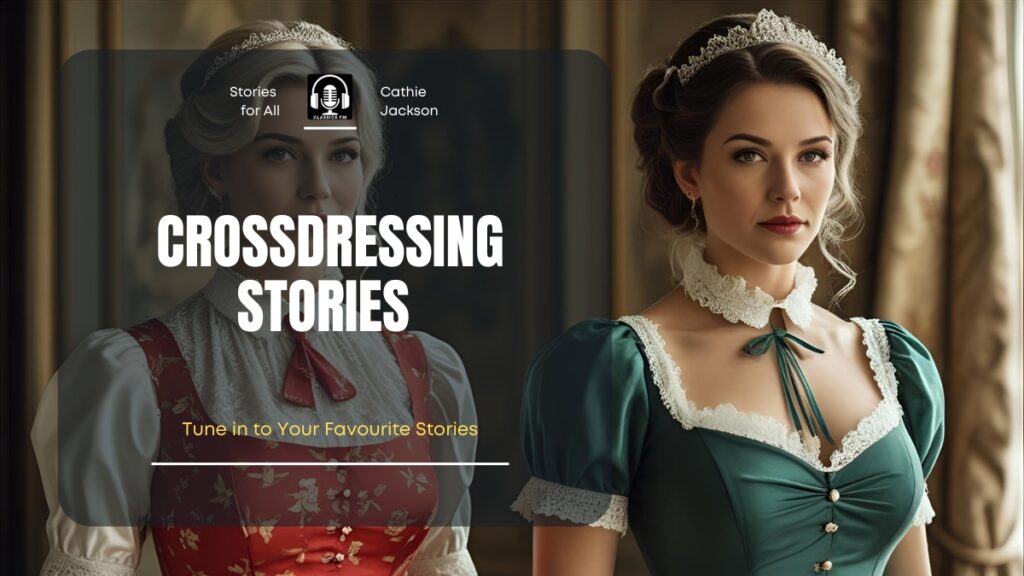You wake up, check your phone, eat quickly, and head to class. You smile at people, answer messages, and sit through lectures. On the outside everything looks normal. On the inside you might feel tired, worried, or numb. That gap between what you show and what you feel is real for many students.
This Short Story on Mental Health for Students is for you — the student who feels the pull of school and life at the same time. It is simple, honest, and practical. No big words. No guilt. Just clear ideas you can use right away.
What mental health really means?
When people hear “mental health” they often think only of illness. That is part of it, but not all of it. Mental health is how you think, how you feel, and how you deal with daily life. It is like physical health. Some days you feel good. Some days you do not. Both are normal.
Good mental health helps you study, sleep, and connect with friends. Poor mental health makes those things harder. It does not mean you are weak. It means you might need rest, support, or different tools.
Short Story on Mental Health for Students
Students look fine on the outside, but inside many feel tired, stressed, or lost. This is a simple, honest look at what mental health really means for students.
1. The Perfect GPA
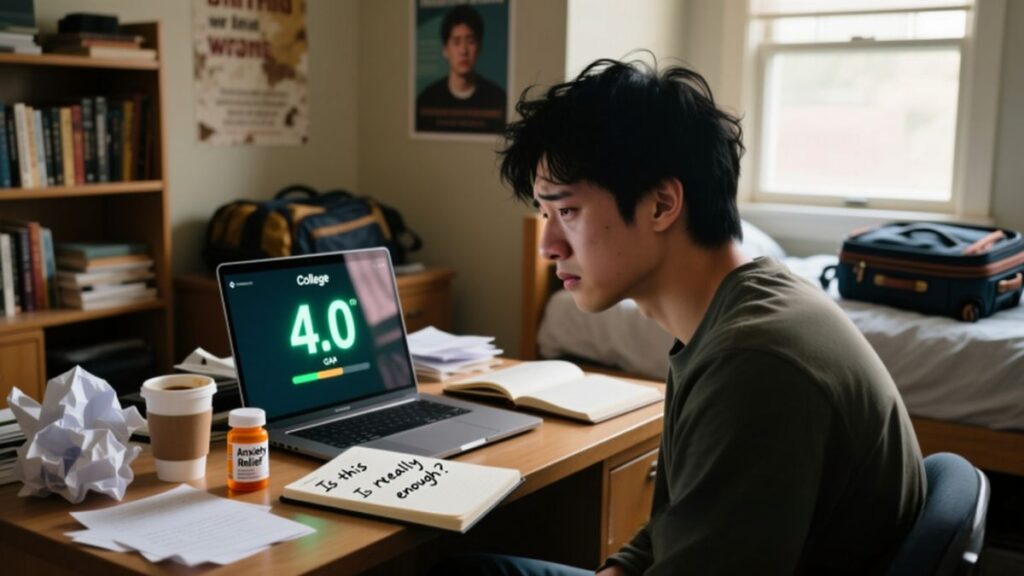
Emma looked perfect.
Her backpack was neat. Her planner was color-coded. Her GPA was the envy of many students.
She smiled in the hallways. She laughed at the right times. She helped younger students when teachers asked. Everyone thought she had it all together.
But inside, Emma felt heavy.
Not physically. Her body moved fine. But her mind never rested. Questions piled up like books on an endless shelf.
Did she study enough?
Was her essay good enough?
Did she annoy her friends?
Would she get into the college she wanted?
The questions never stopped.
It started small.
A little later at night to study.
Skipping lunch to finish homework.
Skipping dinner too.
“Just a phase,” she told herself.
But weeks passed. And months.
Her friends noticed.
She laughed less.
She answered with short words.
She refused movie nights and coffee runs.
When anyone asked if she was okay, she smiled and said, “I’m fine. Just busy.”
One Wednesday, everything cracked.
A big midterm in calculus.
A history essay due the same day.
Three nights of trying to memorize formulas and outline paragraphs.
That morning, she woke up exhausted.
Her head pounded.
Her planner looked like a wall of blinking words.
She could not read it.
She went to the library before school.
Her usual desk. Notes spread everywhere.
But instead of focusing, her eyes wandered.
Formulas blurred. Paragraphs vanished.
Her chest tightened.
Tears fell without warning.
At first, she tried to stop them.
Not here. Not now.
But they kept coming.
Her roommate, Lily, appeared.
Lily froze.
“Emma?” she said softly.
Emma didn’t answer.
She shook her head.
She didn’t know how to explain.
How do you tell someone that everything you worked for feels like it is crushing you?
Lily didn’t push.
She just sat.
Put her hand on Emma’s back.
And waited.
“I can’t… I can’t do it,” Emma whispered.
“You can,” Lily said. “You just need a break. That’s all.”
Emma shook her head.
“I have to… I need to…”
“Shh,” Lily said. “Stop. You’re human. Not a machine. You’re allowed to rest.”
For the first time in weeks, Emma breathed.
She didn’t feel weak.
She felt… relieved.
They stayed together a while.
Just sitting. Quiet.
No words needed.
After that day, Emma started small changes.
She slept a little more.
She ate lunch, even if quickly.
She took short breaks when studying.
Most importantly, she talked about her feelings.
It wasn’t easy.
Some days were still hard.
She worried about grades.
She feared disappointing others.
But sharing her struggles made the weight lighter.
One conversation at a time.
One small step at a time.
Emma learned perfection was not the goal.
Being human was.
Failing a test.
Making a mistake.
Forgetting a deadline.
It didn’t mean she was a failure.
It meant she was living.
Learning.
Growing.
Her teachers noticed.
One day, her calculus teacher asked, “How are you doing?”
Emma hesitated.
“I’ve been really stressed,” she said.
The teacher nodded.
“You’re working hard. But your health matters more than any grade.”
Those words stayed with her.
Emma realized mental health wasn’t weakness.
It was part of life.
She could do her best without hurting herself.
She shared her experience with friends.
At first, she worried they would judge her.
Instead, they thanked her.
They admitted they felt stressed too.
They had just been scared to talk.
Opening up created honesty, understanding, and support.
Weeks later, she still studied.
She still worked hard.
But she also rested.
She laughed at memes with friends.
Joined a weekend hike.
Went to the library and left a sticky note:
“You’re doing your best. That’s enough.”
She couldn’t solve everything.
But she could take care of herself.
Emma’s story is not unique.
Many students in America — high school, college — struggle quietly.
They meet deadlines. Smile at friends. Sit in class like everything is fine.
Inside, they may feel exhausted.
Anxious. Overwhelmed.
Mental health matters.
Feeling stressed or sad does not make you weak.
Asking for help does not make you less capable.
Small steps matter.
Sleep a little more.
Share your feelings.
Take breaks.
Be kind to yourself.
Emma still had goals.
She still wanted to succeed.
But she knew success isn’t just grades, awards, or schedules.
It includes feeling well.
Being human.
Finding support.
Her GPA didn’t define her.
Her courage, honesty, and self-care did.
And that mattered more than any number.
2. The Locker Talk
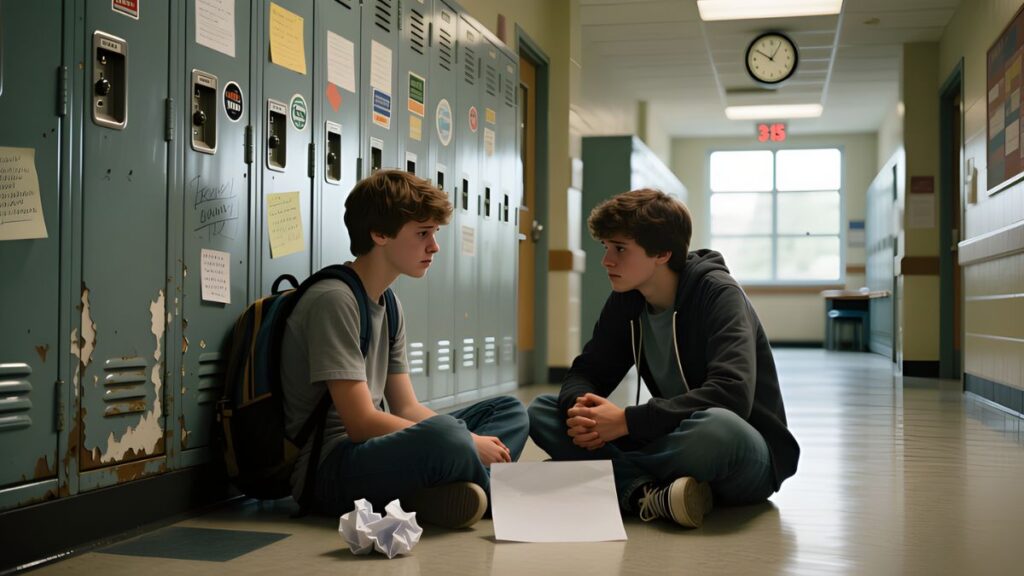
Jake walked down the crowded hallway, backpack slung over one shoulder.
He smiled at people.
Made a joke here.
A quick wave there.
Everyone thought he was the funny guy.
The guy who could lighten any mood.
The guy who always had it together.
But inside… it was different.
Inside, Jake felt heavy.
Not physically. His body worked fine.
But his mind?
It never stopped racing.
Small things piled up.
Tests. Homework. Friend drama. Family expectations.
It felt like carrying a backpack filled with bricks, and nobody knew.
Not even his closest friends.
Jake had learned to hide it well.
Smile. Laugh. Make people forget.
Even when the world felt overwhelming.
But hiding everything comes at a cost.
One Thursday, it hit him harder than usual.
He had a math quiz, an English essay due, and basketball practice later.
He didn’t sleep well the night before.
His stomach ached.
His chest felt tight.
And yet, he kept going.
At his locker, he slammed it shut a little too hard.
A few students glanced at him. He smiled.
“Hey Jake, you good?”
“Yeah,” he said quickly. “All good.”
He grabbed his books and walked to class.
Inside, he tried to focus.
The teacher talked. Notes scrawled on the board.
Jake nodded. Smiled when asked questions.
Answered correctly when called on.
But every time he looked down at his notebook, his mind felt like mud.
Words swirled. Numbers twisted.
He could not focus.
After class, his friends called him over.
“Yo, you coming to lunch?”
“Yeah,” Jake said.
He followed them, laughing at the right times.
But inside, his energy was drained.
It was exhausting — being the funny guy, the go-to friend, the “always okay” one.
By mid-afternoon, Jake felt like collapsing.
His backpack weighed more than usual.
His legs ached.
His mind screamed: You’re not okay.
But he pushed it down.
That’s what he always did.
That’s what everyone expected.
But then… Coach Thompson called him after practice.
“Jake, can I talk to you?”
Jake froze.
His heart started racing.
He nodded.
Coach led him to the bleachers, away from everyone.
“Jake… I’ve noticed something,” the coach said gently.
Jake blinked. “Uh… what?”
“You’ve been quiet lately. Not yourself. I just want to check in.”
Jake’s throat went dry.
He swallowed.
He wanted to shrug it off.
Say, “I’m fine.”
But… he couldn’t.
Not this time.
“I… I don’t know,” Jake whispered.
“Sometimes… I just feel… heavy. Tired all the time. I don’t know how to stop thinking.”
Coach Thompson nodded.
“Thanks for telling me, Jake,” he said. “I get it. I’ve been there. You’re not alone.”
Jake blinked.
He had expected judgment. Criticism. A lecture.
But not understanding.
Not kindness.
“Do you want to talk more? Or just sit for a bit?” the coach asked.
Jake nodded.
They sat on the bleachers. Quiet. Just the sound of sneakers squeaking and the gym clock ticking.
For the first time in weeks, Jake didn’t feel the need to perform.
No jokes. No smiles. No pretending.
Just… being.
“You know,” Coach said after a while, “it’s okay not to be okay. Being strong doesn’t mean carrying everything alone. Being strong means knowing when to ask for help.”
Jake nodded.
It felt… freeing.
That afternoon, Jake walked home slower than usual.
He noticed the leaves on the trees. The wind on his face.
The small things he had stopped seeing.
When he got home, his mom asked how his day was.
“Fine,” he said automatically.
But then he paused.
“I… had a rough day,” he admitted.
She looked at him, concerned but calm.
“Do you want to talk about it?” she asked.
Jake nodded.
And for the first time, he didn’t have to hide.
He told her everything.
The pressure at school. The stress of basketball. The constant need to be “funny” and “okay.”
She listened.
No judgment. No interruption.
Just listening.
“Thanks, Mom,” Jake said.
“Anytime, honey,” she replied.
The next day at school, he felt lighter.
He still laughed with his friends.
Still told jokes.
But now, he didn’t have to hide everything behind them.
He started small changes.
Taking short breaks during study.
Talking to friends honestly when something bothered him.
Going to bed earlier.
Even small things, like breathing deeply before class, helped.
A week later, he went back to Coach Thompson.
“Thanks,” he said. “Talking to you helped.”
Coach smiled. “Anytime, Jake. Remember, it’s okay to ask for help. Always.”
Over the next few months, Jake noticed a change.
He still had stress.
Tests, homework, social pressure — it didn’t disappear.
But it became manageable.
He learned it was okay to share.
Okay to rest.
Okay to not be perfect.
One afternoon, he left a small note in the locker of a friend who looked stressed:
“Hey, you’re not alone. You’ve got this.”
His friend smiled, holding the note close.
That simple act reminded Jake of something important: kindness, understanding, and honesty could travel farther than any joke or smile.
By the end of the year, Jake realized something:
Being the funny guy wasn’t about hiding pain.
It was about using humor, empathy, and honesty to connect.
He still laughed.
Still smiled.
But now, he also paused.
Breathed.
Shared.
He was still Jake — the funny guy, the friend, the teammate.
But now, he was also just… human.
Human, with struggles, feelings, and the courage to face them.
And that made all the difference.
Jake’s locker talk wasn’t just a conversation.
It was the start of a new way of living.
A way where laughter coexisted with honesty.
Where stress could be shared, not hidden.
Where being human was enough.
Where help was not weakness, but strength.
And for Jake, that lesson would stay with him for life.
3. The Cafeteria Seat
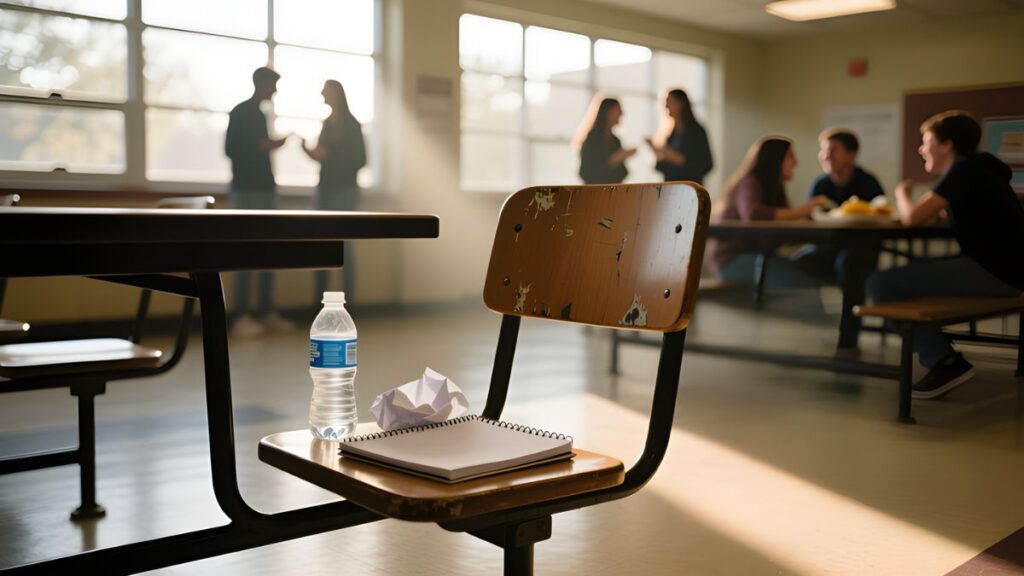
Sophie used to sit with her friends every lunch.
The long tables, the laughter, the clatter of trays — it felt like home.
She loved those moments.
But lately, something had changed.
She stopped joining them.
She didn’t say she was sick. She didn’t say she had homework.
She just… didn’t go.
Instead, she carried her lunch tray and found an empty table in the corner.
She told herself it was temporary.
She told herself she just needed some quiet.
But it wasn’t really quiet.
Her thoughts raced as she ate alone.
She worried about tests.
She worried about friends.
She worried about the future.
She worried about whether anyone would notice her absence.
Most of all, she worried about herself.
Her friends noticed.
One afternoon, Maya, her best friend, leaned over the table they usually shared.
“Sophie, you’ve been sitting alone a lot,” she said gently.
Sophie shrugged. “I’m fine. Just… needed some space.”
Maya frowned but didn’t press.
Sophie felt guilty but couldn’t explain.
It was hard to put feelings into words.
She didn’t even understand all the feelings herself.
All she knew was exhaustion.
All she knew was that the chatter of the cafeteria felt overwhelming.
All she knew was that smiling at everyone felt fake.
That Thursday, Sophie carried her tray again.
Her usual table was loud. Friends were laughing at a joke about a math teacher.
She walked past, hoping no one would notice.
Her stomach hurt from nerves.
Her heart raced.
She found her usual quiet corner.
And sat.
She wanted to disappear into her book.
Pretend the world wasn’t so loud.
Pretend she wasn’t so tired inside.
Then something unexpected happened.
Megan, one of her classmates, slid her tray onto the table next to Sophie.
“Mind if I sit?” Megan asked.
Sophie froze.
Megan was cheerful. Always smiling. Always talking.
Sophie wanted to say no. She wanted to be alone.
But she didn’t.
Megan sat anyway.
Sophie felt awkward.
Megan didn’t.
She unpacked her sandwich and chips.
She hummed quietly.
Sophie stared at her food.
Neither spoke.
And that was okay.
Sometimes silence is the first step.
Over the next few minutes, Sophie started to relax.
Megan didn’t force conversation.
She didn’t ask questions she didn’t want to answer.
She just sat.
She was there.
And Sophie realized she hadn’t felt safe like this in weeks.
She hadn’t realized how much she missed the simple act of sitting with someone.
“You okay?” Megan finally asked.
Sophie blinked.
“Uh… yeah. I guess.”
Megan smiled.
“You don’t have to be fine,” she said.
Sophie blinked again.
“Sometimes… it’s okay not to be okay,” Megan added.
Something inside Sophie shifted.
She nodded.
And for the first time in weeks, she felt a little lighter.
The next day, Sophie saw Megan again in the cafeteria.
She didn’t hesitate this time.
She carried her tray to the empty corner and sat.
Megan waved.
Sophie smiled, really smiled.
It felt strange, but good.
They ate in silence at first.
Then Megan told a story about a cat she had seen online.
Sophie laughed quietly.
It felt safe to laugh.
It felt safe to exist in that space without pretending.
Over the next few weeks, Sophie started to notice changes.
She still had anxious days.
The cafeteria still felt overwhelming sometimes.
But she didn’t avoid it completely anymore.
She started sitting closer to her friends again.
Sometimes she still needed the quiet corner.
Sometimes she joined the loud table.
And both were okay.
Sophie realized something important:
She didn’t have to face life alone.
She didn’t have to solve everything in her head.
She didn’t have to pretend.
Small acts — sitting with someone, letting someone sit with you, sharing a smile — could change everything.
She remembered how much weight had lifted simply because Megan had asked, “Mind if I sit?”
It was simple.
It was small.
But it was powerful.
One afternoon, Sophie noticed another student, a freshman, sitting alone.
He looked nervous, awkward, unsure.
She remembered herself weeks ago, sitting in her quiet corner, overwhelmed by everything.
She grabbed a tray and slid into the seat across from him.
“Hey,” she said softly.
He looked up, startled.
“You okay?” she asked.
He shrugged.
“Just… lunch,” he muttered.
Sophie nodded.
“I get it. You don’t have to talk. You can just… sit,” she said.
He blinked, then gave a small smile.
And just like that, she passed on the kindness she had received.
Over time, Sophie started noticing other students more.
The quiet girl who always ate alone.
The boy who stayed in the corner with his headphones.
She stopped assuming everyone was fine.
She started checking in.
She started listening.
And in doing that, she felt a change in herself too.
By the end of the school year, Sophie realized something important:
She could still have bad days.
She could still feel anxious.
She could still want to hide.
But she didn’t have to hide completely.
She had allies.
She had friends.
She had people willing to sit with her.
And that made all the difference.
The cafeteria seat had taught her a lesson:
Sometimes, the smallest gestures are the most powerful.
A smile.
A seat next to you.
A quiet presence.
It could save a day.
It could save a life.
Sophie didn’t feel perfect.
She didn’t feel like she had it all figured out.
But she felt human.
And sometimes, that was enough.
Weeks later, Sophie noticed a sticky note on her table:
“You’re not alone. We’re here.”
She didn’t know who left it.
It didn’t matter.
It reminded her of Megan.
It reminded her of the power of presence.
It reminded her that small acts could ripple far beyond what anyone could see.
By the end of the year, Sophie had grown.
Not because she suddenly solved everything.
Not because life got easier.
But because she learned how to reach out.
And to let others reach in.
The cafeteria seat wasn’t just a corner of a noisy lunchroom anymore.
It was a safe space.
It was a small beginning.
It was proof that no one had to face life entirely alone.
And that lesson would stay with her — far beyond high school.
4. The Dorm Lights
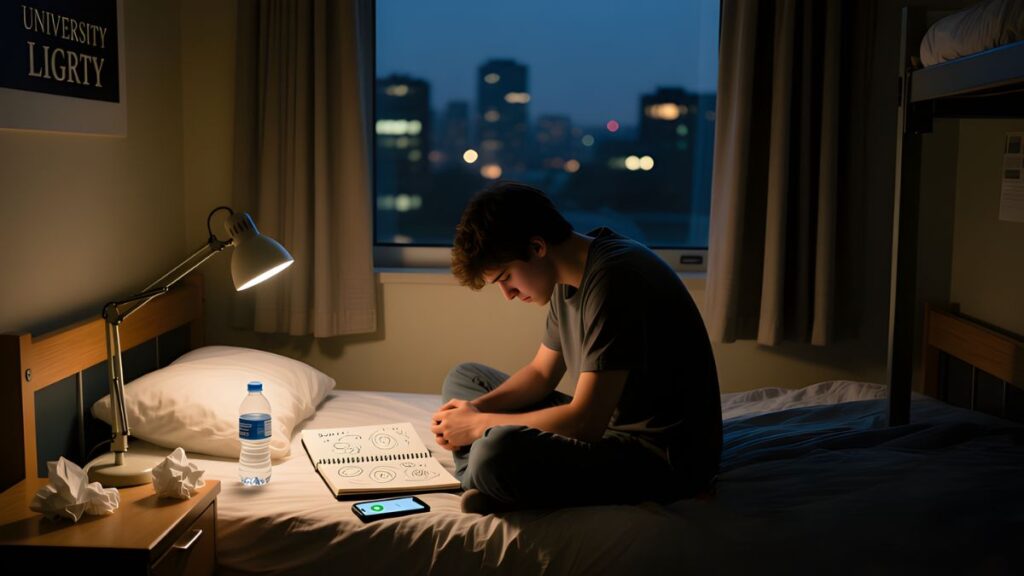
Ethan’s dorm room light was always on at 2 a.m.
He told himself he was just a night owl.
He told his roommate he was catching up on homework.
But the truth was different.
His mind didn’t stop.
It raced.
Memories, worries, doubts — all tangled together.
He couldn’t sleep.
He couldn’t rest.
He couldn’t stop thinking about everything he hadn’t done, everything he might fail at, everything he was afraid of.
During the day, Ethan seemed fine.
He smiled in class.
He raised his hand.
He laughed at the right jokes.
Professors thought he was engaged.
Roommates thought he was social.
Friends thought he was okay.
Even he thought he was okay.
Until the lights came on.
It started slowly.
A late night here.
A skipped meal there.
A lecture he barely remembered because he was too tired.
He told himself it was temporary.
“Just a rough patch,” he said.
But rough patches stretched.
Days became weeks.
Weeks became months.
And still, the lights were on at 2 a.m.
Ethan tried everything.
He drank tea.
He listened to soft music.
He counted sheep.
He even tried guided meditations.
Nothing helped.
The thoughts kept coming.
The anxiety kept growing.
One night, he couldn’t do it anymore.
He grabbed his phone and typed a message.
“Hey, do you have a minute? I… I’m not okay.”
He hesitated.
He deleted it.
He typed again.
“I can’t sleep. I can’t stop thinking. Can you talk?”
Then he pressed send.
His RA, Jordan, replied immediately.
“Sure. Come to my room.”
Ethan hesitated.
Jordan wasn’t just the resident advisor.
He was a senior, someone who seemed to have life together.
Ethan didn’t know what he would say.
He just knew he needed help.
He put on shoes and walked down the hall.
Jordan opened the door.
“Hey, man. Come in,” he said softly.
Ethan stepped inside.
He didn’t know where to start.
He didn’t know how to explain the constant anxiety.
The racing thoughts.
The loneliness he felt even when surrounded by people.
Jordan didn’t push.
He just offered a chair.
“Want some water?”
Ethan nodded.
They sat in silence.
And slowly, Ethan started talking.
A word here.
A sentence there.
Then a flood of thoughts.
He told Jordan about the lectures he missed.
The friends he avoided.
The nights staring at the ceiling.
The constant worry that he was failing — not in grades, but in life.
Jordan listened.
No judgment.
No quick fixes.
Just listening.
“That sounds really hard,” Jordan said finally.
“I know,” Ethan whispered.
“It is.”
Jordan nodded.
“You don’t have to deal with this alone,” he said.
“I’m here. There’s help. There are options. You don’t have to stay stuck in your room with the lights on.”
That night, Ethan felt a small shift.
It wasn’t a miracle.
The thoughts didn’t disappear.
The anxiety didn’t vanish.
But he felt lighter.
For the first time in weeks, he didn’t feel completely alone.
The next day, Ethan made an appointment with the campus counseling center.
He was nervous.
He worried the counselor would judge him.
He worried they wouldn’t understand.
But he went anyway.
And the counselor listened.
Really listened.
They didn’t tell him to “just sleep” or “relax.”
They helped him find strategies.
Small steps.
Tools.
Guidance.
Over the next few weeks, Ethan tried small things.
He kept a journal.
He wrote down thoughts that made him anxious.
He tracked patterns.
He started exercising lightly in the mornings.
Even small movement helped release tension.
He set limits on phone and social media use at night.
He tried to go to bed at the same time each night.
Some nights were still hard.
Some nights, the light came on at 2 a.m.
But gradually, those nights became fewer.
Ethan also opened up to friends.
He told his roommate he struggled.
He told a classmate he trusted.
He realized people wanted to help.
They didn’t think less of him.
They didn’t judge.
They just listened.
And that was enough.
One evening, Ethan noticed another student in his dorm hallway.
He seemed anxious.
He paced.
He kept glancing at his phone.
Ethan remembered himself, weeks ago, struggling with the lights on.
He approached gently.
“Hey,” Ethan said softly.
The student jumped slightly.
“Hey… um… I’m fine,” he muttered.
Ethan nodded.
“You don’t have to be fine all the time,” he said.
The student looked confused.
“Sometimes it’s okay to talk. Even just to someone you trust,” Ethan added.
The student nodded slowly.
And for a moment, a small connection formed.
Over time, Ethan realized something important.
He could still have late nights.
He could still feel anxious.
He could still feel overwhelmed.
But he didn’t have to stay alone.
He didn’t have to hide.
He had tools.
He had support.
He had people willing to listen.
By the end of the semester, Ethan’s dorm room light wasn’t always on at 2 a.m.
He still had hard nights.
He still worried about grades and life.
But he could manage it.
He could talk about it.
He could take a break without guilt.
He could ask for help.
And that made all the difference.
Ethan learned that mental health isn’t about never struggling.
It’s about noticing when you need help.
It’s about taking small steps.
It’s about letting others in.
Even small acts — a conversation, a listening ear, a quiet presence — can change everything.
By the end of the year, Ethan was different.
Not perfect.
Not free of worry.
But resilient.
Aware.
Human.
He still studied hard.
He still had ambitions.
But he balanced them with care for himself.
He left his dorm light on less often.
He even started checking in on other students quietly.
Sharing what he learned.
Passing along the support he had received.
One night, he sat in his dorm, lights low, journal open.
He wrote:
“Some nights will be hard. Some thoughts will race. But I don’t have to face them alone. I can ask. I can rest. I can be human.”
He smiled slightly.
For the first time, he felt that sentence was true.
And that truth changed him more than any grade, any test, or any lecture ever could.
Ethan knew the dorm lights might flick on again someday.
But now, he knew he could face them.
He could face the anxiety.
He could face the fear.
He could face himself.
And he didn’t have to face it alone.
Because sometimes, the smallest moments — a conversation, a kind ear, a hand reaching out — are what save us.
And sometimes, that’s all we need.
5. The Group Project
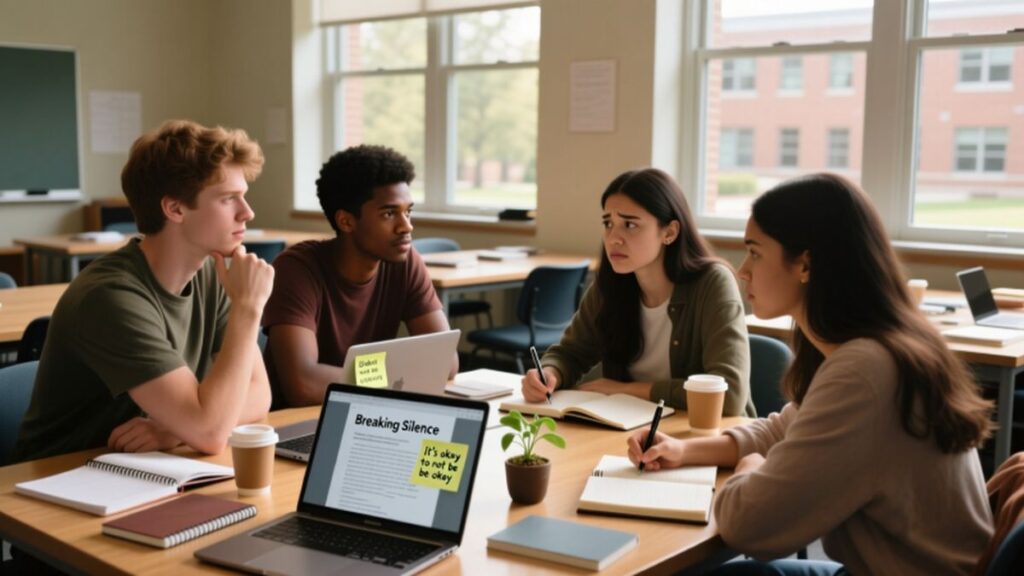
Lena hated group projects.
Not because she disliked working with others.
Not because she was lazy.
Because speaking in front of people made her chest tighten.
Her palms sweat.
Her voice shook.
Even when she knew the answers.
This semester, her professor assigned a group project in English.
Four students, one presentation.
Lena froze when she saw the names.
She knew most of them slightly.
Not friends. Not strangers.
Somewhere in between.
The first meeting was in the library.
Everyone pulled up chairs around a table.
Notes, laptops, and half-empty coffee cups filled the space.
Lena tried to focus.
She tried to think of ideas.
But her throat tightened.
Her hands trembled.
Every time someone asked her opinion, her mind went blank.
Tyler, one of her group members, noticed.
“Lena, what do you think about this idea?” he asked.
She froze.
She opened her mouth.
Nothing came out.
A lump formed in her throat.
Her face turned hot.
Tyler smiled gently.
“Take your time. We’ve got you,” he said.
Something about those words eased her panic a little.
It wasn’t a magic fix.
But it was enough to let her breathe.
Over the next few meetings, Lena tried small steps.
She wrote down ideas before speaking.
She practiced sentences in her head.
She reminded herself she didn’t have to be perfect.
She just had to contribute.
During one meeting, they had to assign roles.
Lena panicked.
Her voice shook as she said, “I… I can write the introduction?”
Tyler nodded.
“Perfect,” he said. “Take your time. No rush.”
For the first time, she felt like her contribution mattered.
Like she had a place.
They started working on the project.
Lena focused on her section.
She still felt anxious.
She still had nights where she doubted herself.
But she also had support.
Tyler and the others checked in regularly.
“Do you need help?” Tyler asked.
“Do you want feedback?” another teammate asked.
Lena realized asking for help didn’t make her weak.
It made her stronger.
Presentation day arrived.
Lena was nervous.
Her chest tightened.
Her stomach twisted.
Her hands shook.
She wanted to run out the door.
But she remembered Tyler’s words.
“Take your time. We’ve got you.”
They started presenting.
Her group members spoke confidently.
Then it was Lena’s turn.
She took a deep breath.
She looked at the audience.
Her heart raced.
Her hands trembled.
But she began.
“I wrote the introduction about…”
Her voice cracked slightly.
Tyler gave her a small nod from the side.
“Good,” he mouthed.
She continued.
Sentences flowed.
Her voice grew steadier.
By the end, she smiled.
Not because it was perfect.
But because she had done it.
She had faced the fear.
And survived.
After the presentation, her group cheered.
Her professor gave positive feedback.
“Excellent work,” he said. “Great teamwork.”
Lena felt a wave of relief.
She hadn’t just survived.
She had contributed.
She had mattered.
Over the next few weeks, Lena noticed a change in herself.
She raised her hand more often in class.
She spoke up in small group discussions.
She still felt anxious.
But she no longer let fear stop her completely.
One afternoon, Lena saw another student struggling in a group.
Her hands shook.
Her face was red.
She reminded Lena of herself just weeks ago.
Lena walked over gently.
“Do you want some help?” she asked softly.
The student looked up, surprised.
“Yes… please,” she said.
Lena smiled.
She shared what had helped her.
She shared how small steps and supportive people made a difference.
And she realized something important:
Helping someone else helped her too.
By the end of the semester, Lena had learned a few lessons.
She still felt nervous sometimes.
She still had doubts.
But she had tools.
She had friends.
She had learned that small encouragements mattered.
A gentle nod.
A patient smile.
A teammate saying, “We’ve got you.”
Those moments could change everything.
Lena also realized that perfection was never the goal.
Participating.
Trying.
Being present.
Being human.
That was enough.
Grades, awards, or flawless presentations didn’t define her.
Her courage, her effort, her persistence — that was what mattered.
By the end of the school year, Lena was different.
Not perfect.
Not fearless.
But braver.
More confident.
More willing to reach out.
And she knew she didn’t have to do it alone.
One day, she left a note on a library table:
“It’s okay to be nervous. You can do this. You’re not alone.”
She didn’t know who would read it.
It didn’t matter.
She knew the message was true.
And she had learned it firsthand.
Group projects, once terrifying, had taught her resilience.
They had taught her courage.
They had taught her the importance of support.
And they had taught her that sometimes, the smallest words — like, “We’ve got you” — could make the biggest difference.
By facing her fear, Lena had grown.
She could still struggle.
She could still feel anxious.
But now she had confidence that she could face it.
She had tools.
She had allies.
And she had learned that being human, vulnerable, and courageous mattered far more than being perfect.
Lena smiled to herself as she packed up her books.
She remembered her first meeting.
Her shaky voice.
Her racing thoughts.
Now, she walked taller.
Her heart still fluttered sometimes.
But she faced life differently.
With courage.
With help.
With hope.
And that, she realized, was enough.
6. The Missed Game
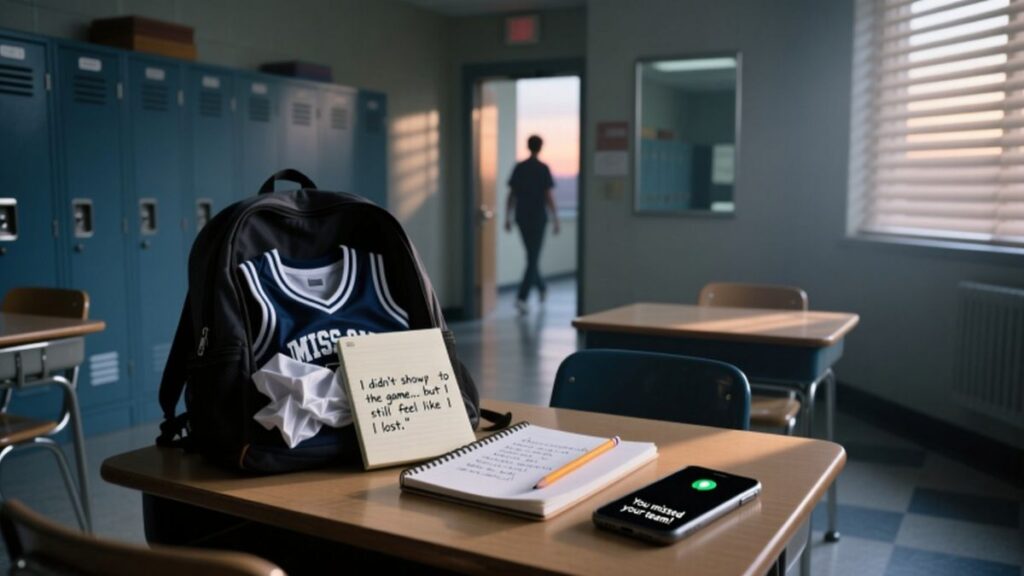
Marcus loved basketball.
The squeak of sneakers on the court.
The swish of the net.
The high-fives after a good play.
The energy of his teammates.
Basketball wasn’t just a game.
It was who he was.
But lately, something had changed.
Practices felt heavier.
Games felt stressful.
Even the moves he once loved seemed forced.
He still wanted to play.
But the pressure was crushing.
It started small.
A missed shot here.
A forgotten play there.
Tiredness that sleep couldn’t fix.
Then the anxiety crept in.
The worry.
The fear of letting everyone down.
Schoolwork piled on top.
Family expectations loomed.
Everything felt like too much at once.
Marcus tried to push through.
He told himself he was strong.
He smiled at practice.
He nodded at his coach.
He laughed at teammates’ jokes.
But inside, he was drained.
One Friday afternoon, Marcus knew he couldn’t play the big game.
His chest tightened.
His stomach twisted.
His thoughts raced.
He felt guilty.
Ashamed.
Weak.
But he also knew he had to listen to himself.
He needed a break.
He went to Coach Reynolds.
“I… I can’t play today,” Marcus said quietly.
Coach’s eyes narrowed.
“You can’t? Explain,” he said.
“I… I’m not feeling right. I need to rest,” Marcus admitted.
Coach paused.
Marcus expected anger.
A scolding.
Judgment.
Instead, Coach leaned back.
“Okay,” he said simply.
“Take the week off,” Coach added.
“You’re more important than the scoreboard.”
Relief washed over Marcus.
It wasn’t guilt.
It wasn’t shame.
It was acceptance.
Someone understood.
Someone cared more about him than the game.
That night, Marcus sat on his bed.
He thought about all the pressure he carried.
All the sleepless nights.
All the fear of failing.
All the worry about letting his team down.
For the first time in weeks, he let himself breathe.
The next day, he called his best friend, Jamal.
“Hey,” Marcus said quietly.
“Hey man, you okay?” Jamal asked.
“I… missed the game yesterday. I couldn’t play,” Marcus admitted.
“You did the right thing,” Jamal said.
“Health first, always.”
Marcus felt supported.
Not judged.
Over the next few days, Marcus rested.
He slept.
He ate properly.
He went for walks.
He journaled his anxious thoughts.
Some nights were still hard.
Some days, worry returned.
But he had tools now.
Coach checked in regularly.
“How’s it going?” he asked during practice the following week.
“Better,” Marcus said.
“Remember,” Coach said, “asking for help isn’t weakness. It’s smart.”
Those words stuck.
Marcus realized mental health was part of being an athlete.
And part of being human.
Marcus also opened up to teammates.
He explained his anxiety.
He told them why he missed the game.
Instead of teasing, they listened.
They shared their own struggles.
Some had fears they kept secret.
Marcus realized he wasn’t alone.
Talking made the burden lighter.
Practice returned to normal.
Marcus ran drills.
He made shots.
He laughed at mistakes instead of panicking.
The game after his break, he played.
He still felt anxious.
But he was present.
Focused.
The team cheered together after the win.
Marcus felt something deeper than the scoreboard.
He felt relief.
He felt resilience.
He felt himself again.
Marcus noticed other students struggling too.
The quiet teammates.
The ones who looked tense or overwhelmed.
He reached out.
Small conversations.
Checking in.
Encouraging breaks.
Sometimes listening was enough.
By the end of the season, Marcus had learned a few lessons.
It’s okay to step back.
It’s okay to miss a game.
It’s okay to ask for help.
It’s okay to be human.
The scoreboard does not define you.
Grades do not define you.
Achievements do not define you.
One evening, he left a note in the locker room:
“It’s okay to rest. It’s okay to talk. You’re not alone.”
He didn’t know who would read it.
It didn’t matter.
He knew it was true.
By the end of the year, Marcus was stronger.
Not because he never struggled.
Not because he never felt anxious.
But because he learned to manage it.
He had tools.
Support.
Courage.
He realized basketball wasn’t just scoring points.
It was teamwork.
Support.
Trust.
And self-care.
Marcus still loved basketball.
He still played hard.
But he balanced it with self-care.
He shared his experience with others.
He helped teammates.
He encouraged them to speak up.
By helping others, Marcus felt stronger.
By being honest about struggles, he felt lighter.
By taking care of himself, he could enjoy the game again.
He smiled after practice.
He laughed at mistakes.
He encouraged teammates.
He rested when needed.
He asked for help when needed.
And sometimes, that was enough.
Marcus learned the biggest lesson:
Mental health matters more than a game.
More than a scoreboard.
More than any win or loss.
Taking care of yourself is not weakness.
It’s strength.
It’s courage.
It’s human.
7. The Library Note

Ella loved the library.
It was quiet.
Organized.
A place where she could focus.
A place where the world outside didn’t seem so overwhelming.
But lately, even the library felt too much.
She’d sit at a table, books open, pens ready.
But her mind wandered.
Her thoughts raced.
Homework, tests, friends, family expectations — everything tangled together.
She couldn’t focus.
She couldn’t breathe.
She couldn’t rest.
Ella used to feel in control.
Organized notes. Timed study sessions.
Color-coded planners.
Everything had a place.
Everything had a purpose.
But now, the routine felt empty.
The pressure felt endless.
The anxiety felt constant.
One Tuesday afternoon, Ella walked into the library carrying her backpack like a weight.
She found her usual seat by the window.
She unpacked her books.
She opened her laptop.
She stared at the screen.
Nothing happened.
No ideas. No focus.
Just stress.
She felt tears prick her eyes.
She wiped them away.
No one was around.
But still, she felt embarrassed.
Why couldn’t she handle this?
She had always been strong.
She had always managed.
So why now?
As she sat there, her gaze fell on a small sticky note stuck to the edge of her table.
“You’re not alone. Take a deep breath.”
Ella blinked.
She didn’t know who had left it.
She didn’t know why.
But somehow, it made her heart feel a little lighter.
She read the note again.
“It’s okay to struggle. You can ask for help.”
Ella smiled faintly.
It was strange.
A small note from a stranger in a quiet library gave her a tiny spark of hope.
For the first time that week, she breathed deeply.
She set aside her laptop.
She closed her planner.
She let herself sit.
And simply breathe.
The next day, Ella returned to the library.
She wasn’t sure what made her go back.
Maybe curiosity.
Maybe hope.
Maybe she just wanted that small reminder that someone cared.
She found another note.
“One step at a time. You’ve got this.”
Ella felt warmth spread through her chest.
Someone understood.
Even if they didn’t know her.
Even if they didn’t know her struggles.
That week, Ella started small changes.
She scheduled breaks.
She ate lunch before studying.
She wrote down her thoughts instead of letting them swirl endlessly in her head.
Some nights were still hard.
Some days were overwhelming.
But the notes gave her small moments of comfort.
Moments that reminded her: She could handle this.
Ella began to notice other students in the library.
The boy who always sat alone with his headphones.
The girl who tapped her pencil nervously.
The freshman who seemed lost in her books.
They all looked like they were fighting invisible battles.
Ella realized she wasn’t the only one struggling.
One day, she found a student sitting in tears.
He had his head in his hands.
She hesitated.
Her heart wanted to help.
Her mind said, Stay out of it. Mind your own business.
Then she remembered the sticky notes.
Small gestures mattered.
Even small words could change someone’s day.
“Hey,” she said softly.
He looked up, startled.
“Are you okay?” she asked gently.
He shook his head.
“I just… I can’t focus. Everything is too much,” he admitted.
Ella nodded.
“I understand,” she said. “It happens. Take a deep breath. One thing at a time.”
He blinked.
“I… thanks,” he whispered.
That was enough.
Over the next few weeks, Ella started leaving her own notes.
Small messages of encouragement.
“You’re doing your best. That’s enough.”
“It’s okay to rest. You’re human.”
“Keep going. One step at a time.”
Sometimes students noticed them.
Sometimes they didn’t.
But the act of writing them made Ella feel stronger.
She also started speaking up more.
Asking classmates if they wanted to study together.
Sharing study tips.
Checking in on friends.
Even small interactions made the burden feel lighter.
She realized she didn’t have to face life alone.
Her grades improved, not because studying became easy, but because her mind was clearer.
Her friends noticed a change.
She smiled more.
She laughed more.
She seemed… lighter.
One afternoon, Ella found a sticky note on her favorite table:
“Keep going. You’re stronger than you think.”
She smiled.
Her heart felt full.
Even strangers cared.
Even small gestures mattered.
By the end of the semester, Ella had learned several lessons.
Mental health wasn’t weakness.
Asking for help wasn’t failure.
Small steps could create big changes.
Support could appear in unexpected ways.
Even a tiny note on a library table could change a day.
Ella continued leaving notes.
She helped classmates.
She checked in on friends.
She remembered that struggling didn’t mean failing.
It meant being human.
It meant learning to ask for help.
It meant taking care of herself.
She still had hard days.
Library sessions that felt overwhelming.
Moments of anxiety.
Moments of doubt.
But she had tools.
She had support.
She had hope.
One evening, she wrote her final note for the semester:
“You are enough. You are seen. You are not alone.”
She left it on the table.
She walked away, smiling.
Knowing it might help someone.
Even if she never knew who.
By the end of the year, Ella realized the library was more than a place to study.
It was a place of connection.
Of understanding.
Of small gestures that mattered.
It was proof that mental health care could appear anywhere.
And sometimes, all it took was a simple note.
The library note had changed her.
It had reminded her:
It’s okay to struggle.
It’s okay to ask for help.
It’s okay to take breaks.
It’s okay to be human.
She smiled as she packed up her books.
The semester was ending.
The notes were gone.
But the lessons stayed.
And Ella knew she was stronger than she had ever realized.
She walked out of the library, taking a deep breath.
Feeling lighter.
Feeling human.
Feeling ready for whatever came next.
Why students struggle: the hidden pressures
Student life looks simple: classes, homework, exams. But many quiet pressures build up:
Academic stress. Deadlines, grades, and the need to perform can feel heavy. Burnout can start slowly and then take over.
Social stress. Making friends, fitting in, and keeping up online is tiring. Social media makes comparison easy and painful.
Family expectations. Wanting to make family proud is important, but it can also add pressure when your path is different.
Future worries. What job will you get? How will life turn out? Big questions like these can feel scary when you are still figuring things out.
These pressures overlap and make small worries into big ones. Often it shows as quiet tiredness or worry, not loud drama.
Signs you or a friend might be struggling
Problems can be small at first. Look for these signs:
Emotional signs
- Feeling sad, empty, or on edge much of the time
- Getting easily irritated
- Big mood changes
Thinking signs
- Overthinking or repeating negative thoughts
- Trouble concentrating or deciding
- Feeling hopeless
Physical signs
- Sleeping too little or too much
- Headaches, stomach aches, or persistent tiredness
- Changes in appetite or weight
Behavioral signs
- Pulling away from friends or activities
- Missing classes or falling behind
- Using alcohol, drugs, or too much caffeine to cope
One or two signs do not always mean something serious. But if they last weeks or hurt daily life, it is time to act.
Small, practical steps that help
You do not need to fix everything at once. Try one small thing today.
Talk to someone
Say, “I have not been feeling like myself.” Tell a friend, family member, teacher, or counselor. Saying it out loud helps. Asking for help is smart, not weak.
Sleep matters
Try a regular bedtime and wake time. Make your room calm and avoid screens before sleep if you can. Better sleep helps mood and focus.
Move a little
Walk, stretch, or try a short workout. Movement helps your brain and eases stress.
Break work into chunks
Do 25 minutes of work, then take a five minute break. Or just write one paragraph to start. Small wins add up.
Try short mindfulness
Take three deep breaths before a test. Notice your body for two minutes. Small practices help calm worry.
Limit social media
If scrolling makes you feel bad, take a break. Remove apps from your lock screen or set quiet times.
Write one line
Each day, write one sentence about how you felt or one thing that went well. It helps you see patterns.
Plan for busy times
Mark big deadlines on a calendar and plan breaks, meals, and sleep. Planning lowers panic.
Get professional help when needed
Counselors and therapists can help you cope and find tools. Many schools offer free or low-cost services. That is a good option.
How friends and schools can help?
Mental health is not only your job. Friends and schools matter.
Friends
- Listen more than you solve. “I am here” is powerful.
- Check in with a message or call.
- Offer to go with them to talk to a counselor.
Teachers and schools
- Give clear deadlines and some flexibility when possible.
- Make counseling easy to find.
- Talk about mental health openly in class.
Families
- Ask open questions: “How are you feeling?” instead of “Why are your grades low?”
- Offer practical help or a listening ear.
When people around you make space for mental health, it is easier to ask for help.
Breaking the stigma
Stigma makes people stay quiet. When one person says, “I am not okay” and others respond kindly, it changes things. You do not need to share everything. Even saying you had a tough week helps someone else feel less alone.
Treat mental health like any health topic. Early help matters.
Self-acceptance and small progress
Getting better is not a straight line. Some days will be good. Some days will not. Be kind to yourself. Replace “I should have done better” with “I did what I could today.” Small steps — sleep, talk, move — lead to real change over time.
If you are worried about someone else
If a friend seems distant, ask simply: “You seem quieter. Are you okay?” Say what you noticed without blaming. If someone talks about hurting themselves or seems in danger, act now. Contact campus counseling, emergency services, or a trusted adult. It is better to help quickly.
A hopeful note
These years change fast. Feeling overwhelmed now does not mean you will feel this way forever. With small habits and support, things can improve. Many students who struggled find balance later. It is okay if progress is slow.
Try one small thing: sleep a little more tonight, message a friend, or write down three small wins. One small step can start a better path.
Final words
Mental health is part of being human. It deserves the same care as your body. When students get support from friends, family, teachers, and counselors, they do better in life and study. Asking for help is brave. Small routines help. Honest conversations matter.
You do not need to have everything figured out. You only need to care for yourself while you are figuring things out. If you feel stuck, reach out. A small step today can lead to a better tomorrow.


